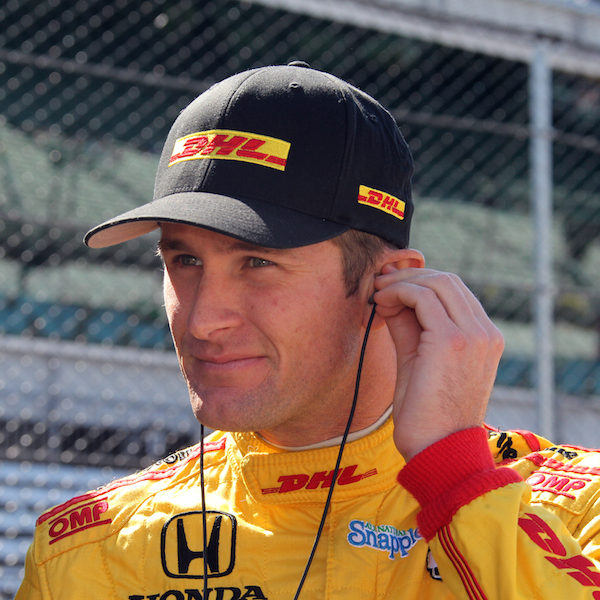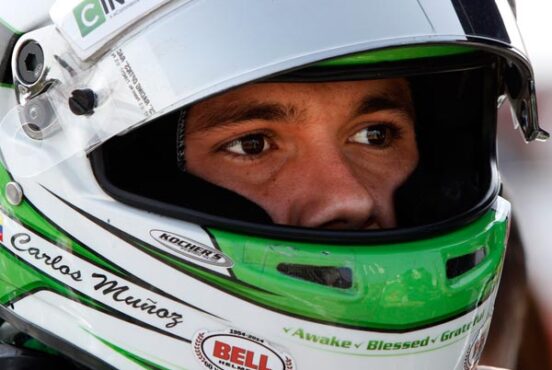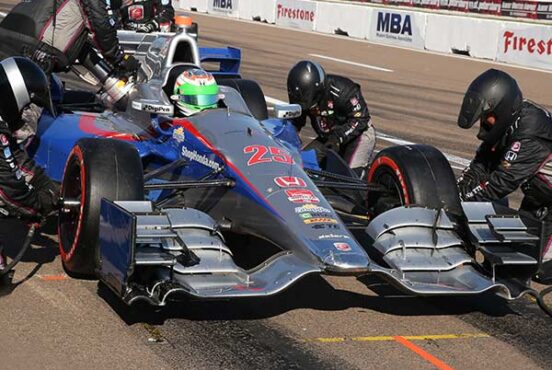Indy 500 Champ Ryan Hunter-Reay isn’t slowing down

On Sunday, Ryan Hunter-Reay will line up to defend his title in the 99th running of the Indy 500. But like most race car drivers, the cockpit isn’t the only place Hunter-Reay goes all out. He free-dives to up his lung capacity, deep-sea fishes to “relax,” and admits that after living his life at breakneck speeds, “it’s hard to wind down.” In fact, Hunter-Reay hit 230-plus mph over the course of four laps for his Indy 500 qualifying drive, and was faced with the terrible crash of his close friend James Hinchcliffe. “You’re so exposed out there — and sometimes those first few laps are terrifying. It’s a terrible feeling,” he says. But at The Smith in NYC, he sat down long enough to enjoy a salad and talk to us about what drives an IndyCar racer. “You want to be the fastest one out there,” he states. “We have to be living on the edge. Good thing there’s a trophy at the end, or else I wouldn’t do it.”
With all of the crashes — James, Helio Castronoves, and Josef Newgarden — that have happened this week, does it feel like a gut check?
Yeah, a bit. It’s a reality check of what can go wrong, and you get reminded each time it happens of just how bad it can go. But every one of the recent crashes has been for a different reason. It’s a tough position to be in, but it’s part of the sport. IndyCar racing has always been and will always be very dangerous — it’s more dangerous than stock-car racing and most other types of racing.
Having those very real examples of what can go wrong just days before the race — does it change anything for you?
It doesn’t really change anything. I’m still going to go out there and put it all on the line, 110 percent. Obviously our thoughts and prayers are with James right now — he is a really close friend of ours, and he is still in the intensive care unit.
If any driver tells you they’re fearless, they’re lying. You have to respect it and know where the limit is and realize the consequences that come with every action you take on the racetrack. But does it change anything? I think it encourages us to look for more ways to make it safer, but I don’t think it changes anything for me. It won’t change the way I drive on Sunday.
It’s interesting that you said, “If any driver tells you they’re fearless, they’re lying.” Solo climber Alex Honnold recently told us, along the same lines, that “everyone has fear; it wouldn’t be natural if this stuff didn’t scare you. It’s not about being fearless, it’s about knowing how to harness your fear and use it to your advantage.”
Absolutely. It’s all about compartmentalizing it. You have to put it in its appropriate spot. If it clouds your decision-making process or affects the way that you do your job, then you need to look at getting another job. You know, a golfer can go out and make a bad shot and end up in the water. If you miss a shot in racing, you can end up in the hospital.
Is it that mental strength and stability that makes a great athlete, or is it a result of training your mind?
Both. The more experience you get racing, the better you become at channeling those feelings and emotions. Sometimes that’s fear, sometimes it’s pressure. Pressure is a big one. You can choose to let it positively affect or negatively affect your outcome. With all of those things, it’s just a matter of managing them.
I think the unique thing about racing is… well, it’s like the climber you just mentioned. Every grab a climber makes can be a life-changing one, and it’s the same for each move a driver makes. There are such high consequences for every action that you take out on the track.
What about training your bodies? What kind of physical training regimen does it take to be ready for a race?
The biggest thing while driving is dealing with the G-forces — you have to be able to support your own bodyweight while taking a turn at 4.5 G’s, which is an insane load. There’s no power steering, which is one of the hardest things about it. There is no ABS, so you have to be able to push 900 pounds of pressure through the break pedal. You basically have to try and put all your weight to stomp your foot through the front of the car. The weight and physical pressure you experience while racing are immense, so you have to be really strong in your core and upper body.
You also have to be fit with your endurance and cardio. I’ve lost ten pounds of water during a road race before. At Sonoma, they put a heart-rate monitor on me, and I was sustained in the 150–175 ranges throughout that race. It was like I was sprinting.
I do running, cardio, weights, and core work. Swimming is a big one for me, and I also do free-diving for cardio. And neck training — because driving at those speeds in the car with the turn is hard on your neck. But there really is no substitute for your body in terms of what racing does to it besides driving. You can’t drop a big weighted plate on your chest to get yourself ready for G-forces.
And it’s not just you who has to be ready on race day. How does having a car and a full team factor into being prepared?
It really is a team sport. If you don’t have every component of that team working, you won’t be successful. You’re relying on them to contribute as much as you are, whether that is the crew or the engineering staff. There are so many things that go into Indy racing that no one really knows about or thinks about, that we have difficulties with. No one sees all of the little details of the race on the standings list afterward. They only know if you won or lost, but there is so much more to it than that because there is so much more to it than a driver and a car.
So when you are up on the podium, everyone just sees you up there with the trophy and the pint of milk. But for you, does it feel like a team victory more than just an individual win?
Oh yeah. At the pit stops you can gain or lose a second on 30 laps, and that adds up to what your team is really doing, or not doing, for the win. They have a lot of pressure. And that’s just during the rest, not even what goes into it all before we get on the track. I trust my life in their hands. If they miss one bolt-tightening on your car, it could result in something like what just happened to James. You just have to trust your team. And that’s scary to start thinking about, because of how many bolts are on that damn thing.
Coming from such a legacy of racing, did any other sport or career ever catch your eye?
I always wanted to be a race-car driver. When you’re young you go to a football game and watch football, but you go to a racetrack and you see cars go by at 230 mph. It was by far the coolest thing I had ever seen. I was like, “Oh my God, that’s life right there.”
But there was a little bit of time there that I wanted to be a quarterback. I’m not tall enough to be a quarterback, though, so it wouldn’t have worked. Russell Wilson’s my idol, but I don’t have what he has.
But you’ve secured your place in American sports history in your own right as the first American since Sam Hornish, Jr. to win both the Indy 500 and the IndyCar Series Championship. How does that feel?
Oh it gave me a lot of pride. I have been rooting for the American drivers since I was a little guy. They were my heroes growing up. I think about the Unsers and the Andrettis. I just think of the history. It’s amazing to be able to bring that full circle, because it’s an American tradition, and the race is bigger than motorsports itself.
Every time you are in the car, there is a pressure to punch above your weight. It’s always looking toward the next step, achieving the next goal. The goal right now is to win another Indy 500 and Championship, however that is achieved.
Well in that case, I hope you like milk. Actually, I was wondering if you get to pick which type of milk you get to drink at the Indy 500 winner’s circle.
Oh yeah, you get to pick beforehand. I pick two-percent. Every year. I figure it’s going to be hot, and two-percent sounds better than whole milk in that situation. And they serve it really cold. Really cold.
After racing season is over, will you take time to relax?
No, not really. After about two days on vacation, you just get so bored. I think it’s because the intensity of the sport. Work for me is high-intensity insanity for a full weekend, and you get dropped off on the other side of a Monday and you let your body recover for a second, and by Wednesday you just don’t know what to do with your life.


